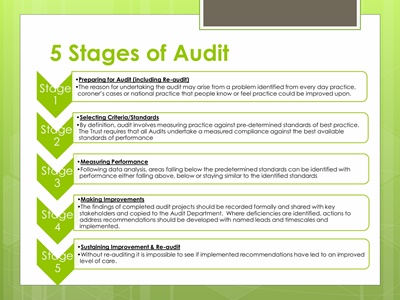
5 Stages of Audit
Stage
1
•Preparing for Audit (including Re-audit)
•The reason for undertaking the audit may arise from a problem identified from every day practice,
coroner's cases or national practice that people know or feel practice could be improved upon.
Stage
2
•Selecting Criteria/Standards
•By definition, audit involves measuring practice against pre-determined standards of best practice.
The Trust requires that all Audits undertake a measured compliance against the best available
standards of performance
Stage
3
•Measuring Performance
•Following data analysis, areas falling below the predetermined standards can be identified with
performance either falling above, below or staying similar to the identified standards
Stage
4
•Making Improvements
•The findings of completed audit projects should be recorded formally and shared with key
stakeholders and copied to the Audit Department. Where deficiencies are identified, actions to
address recommendations should be developed with named leads and timescales and
implemented.
Stage
5
•Sustaining Improvement & Re-audit
•Without re-auditing it is impossible to see if implemented recommendations have led to an improved
level of care.